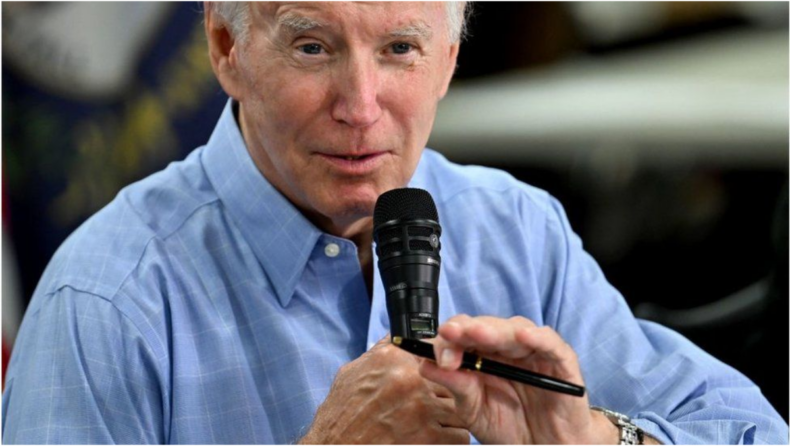President Joe Biden travelled to Kentucky the day after the Senate’s marathon voting session that resulted in the passage of his climate change package to visit with those impacted by floods.

A downpour that rocked the state caused homes to collapse into rivers, left scores of people dead, and left many more missing; this type of tragedy will happen more frequently as a result of climate change.
For the president, it was an opportunity to firmly establish the control of his government over a significant piece of legislation on one of the most crucial topics of our day.
But while delivering an emotional address intended for the people gathered around him whose lives had just been flipped upside down, he was unable to truly connect with them.
Yes, he made a list of his accomplishments, mentioning the infrastructure law from the previous year and his role in bringing down healthcare costs.
However, he managed to brush over his massive $370 billion climate change action plan.
He mentioned building holes in which both water lines and high-speed internet connections might be installed at the same time, at times sounding more like a quantity surveyor than a president.
Former special assistant to President George W. Bush and political strategist Ron Christie was aware of the discrepancy between reality and rhetoric.
“What is he talking about?” I wondered. The BBC was told by Mr. Christie. If you’re going to celebrate, at least have the foresight to discuss the legislation’s provisions in more detail and skill than just mumbling your way through it.
This particular remark brings forth the contradiction of this presidency.
It seems impossible to give credit to a guy whose administration has achieved notable legislative victories on some of the most difficult topics, including infrastructure funding, gun control, and now climate change.
At this stage of the election cycle, surveys show him to be one of the least popular presidents in history.
Only 24% of the Americans questioned were aware that the infrastructure bill he signed into law, which released $500 billion for new roads, bridges, and broadband, had been enacted months after he put his signature on it.
Could this climate measure, which includes $370 billion in subsidies for the creation of green energy and electric automobiles, also pass the electorate?
According to Casey Burgat from the Graduate School of Political Management at George Washington University, “we just don’t know how people will react to this law yet.”
“Even with major, significant pieces of legislation, it’s sometimes difficult for regular people to quickly sense the concrete influence of laws.
Additionally, there are still months before the midterm elections, so the joy from this victory may be fully gone by then.
There is little doubt that some of the headlines imply that Mr. Biden may have passed the low point of his administration and may be poised to regain his popularity.
Despite being the oldest US president in history, you can’t help but notice that he’s moving things forward in a political environment long characterised by gridlock and partisan impasse.
According to Miles Coleman from the University of Virginia Center for Politics, the president is succeeding in his goals.
He said that part of Biden argument to voters during the 2020 election was that he could bring back a feeling of competence to the government after the instability of the Trump administration.
This law would strengthen Biden’s reputation as a president who has been successful in carrying out his policies, if he decides to proceed with his plan to run for office again in 2024.
The risk is that, in comparison to what came before, competency might seem a little… dull.
Normalcy doesn’t get recognised as much, even if some people may have yearned for it following Trump.
Consider the previous president’s observations on climate change.
In a speech in 2019, Donald Trump mentioned wind farms and added, “They claim the noise causes cancer,” while making a loud whirring noise and waving his hand in a circle.
And it’s like a bird cemetery,” he continued.
It scarcely constituted a policy. At least the portion about cancer has no substance in reality.
But it’s a much more memorable soundbite compared to President Biden attempt to sell a complicated and hard-won package of tangible actions that genuinely could go some way to containing global temperature rises.
The climate result has clearly given Democrats a boost. It benefits their base and serves as an example of politics as the art of the conceivable.
But those in Mr. Biden’s party who are looking ahead to reelection campaigns in a few months will want to see traces of it quickly if it is going to convert into a political payoff.













